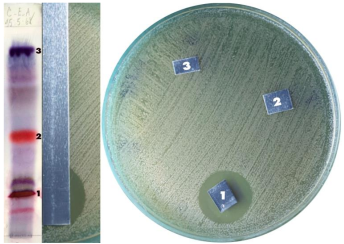Abstract
Lichens are symbiotic systems including mycobiont and photobiont, which produce various secondary metabolites having high potential in drug discovery. The present study investigated morphology, chemical components and antimicrobial activities of methanol extract of Dirinaria applanata (Fée) D.D. Awasthi collected from Ben Tre coconut tree in Vietnam. The antimicrobial capacity of methanol extract was screened on Staphylococcus aureus ATCC 29213 (MSSA), Staphylococcus aureus ATCC 43300 (MRSA), Streptococcus faecalis ATCC 29212, Klebsiella pneumoniae ATCC 35657, Pseudomonas aeruginosa ATCC 27853, Escherichia coli ATCC 25922, Candida albicans ATCC 10231, Candida glablata ND31, Candida tropicalis PNT20, Trichophyton rubrum DS01, and Microporum canis VB2 by agar diffusion assay. Isolation the effective fractions from the methanol extract used bioautography technique and column chromatography. Results D. applanata exhibited strong impact on gram positive bacteria and fungal strains with the zone inhibition diameter from 13 to 31 mm. PĐ-D-2T, isolated by column chromatography method, reaches the purify on TLC and has the minimum inhibitor concentration at 115 µg/ml on methicillin-resistant Staphylococcus aureus and Streptococcus faecalis. Conclusion D. applanata possesses the high potential in developing the antimicrobial drug. In the following study, we will identify the chemical structure of PĐ-D-2T and evaluate its effects on biofilm models of gram positive bacteria and yeast strains. Keywords: lichen, Dirinaria applanata, antimicrobial
